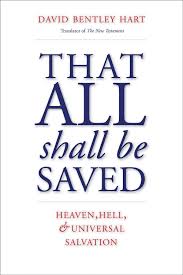David Bentley Hart has set off some theological fireworks with his book That All Shall Be Saved. In it he argues that any teaching that does not proclaim the final salvation of all is incoherent and indeed monstrous.
The eternity of punishment in hell is the point of controversy. But it seems that both sides in the controversy overlook an important point: time is only a creature, and like all creatures will be transformed in the New Creation. Therefore, it makes no sense to think of punishment going on forever in the type of linear time in which we live.
Time, as we know it, involves coming into being and passing away, that is, death. Beings in linear time are always passing away. As Augustine pointed out, the past no longer exists and the future does not yet exist. All that exists is the moment, which instantaneously becomes the past and ceases to exist.
But in the New Creation God will transform this into the pleroma, the fullness, when God will be all in all. Time in the New Creation will not be the linear time we know, and will not involve a coming into being and passing away. We cannot comprehend this, but we know it must be true, because death will be no more.
Those who have raised objections to the arguments of von Balthasar and Hart often forget this transformation of time. Some of them also indicate that they will be disappointed if all will be saved, after all the solemn warnings Scripture and the Church have given. Jonah is their patron prophet. Jonah knew that God would not carry out his threats, that God was a softie, and that He would make Jonah look like a fool. Better that Nineveh should be destroyed with all its infants and animals, than that Jonah should be embarrassed. Better that all the unbaptized should burn in hell forever, including the majority of the human race which dies probably before birth, and definitely before the age of reason, than that the necessity of baptism should be called into question.

Rhetorically… Did you ever in your youth believe in Limbo, that place of natural happiness where the unbaptized go? I submit that there are 7 times more souls there than in heaven and hell combined. Why? Because one presumably has to be born live to contemplate a journey to heaven or hell while science indicates that only about one in eight conceptions takes fruitful hold in the womb and matures to a live birth.
I am not arguing in favor of a mega Amazon warehouse of souls, rather than we might think more broadly of what human life means.
For example, as a scientist or engineer one might appreciate that conservative principles of problem definition would justify defining conception as the natural start of life, perhaps that the overwhelming mass of souls never experience life might drive us to wonder at what live means.
A very good question. I often reflect upon it. I am one of the infinitesimally small percentage of people who: make it to birth; survive childhood; live in a modern, prosperous society; have a fairly high intelligence; have a good education, including Latin; have a stbel, 40 year marriage to a loving, pious, intelligent wife; have six children; have teh gift of catholic faith; have the ability to write and the resources to publish, etc. What responsibility do these advantages invur?
Cardinal Ratzinger said that Limbo was just a theory and most theologians now believe that God’s universal love and desire that all be saved certainly means that those who did not even have the ability to sin, unborn, infants, small children, are saved. Those of us who live longer and have the possibility of sin and repentance play a different role in the history of salvation. Why does God do this? Someday we will find out.